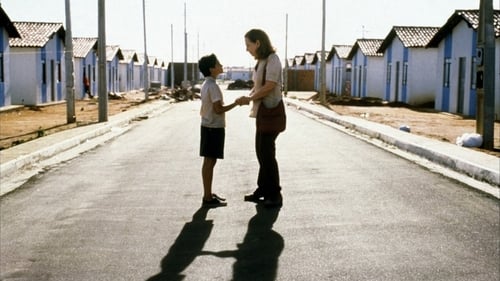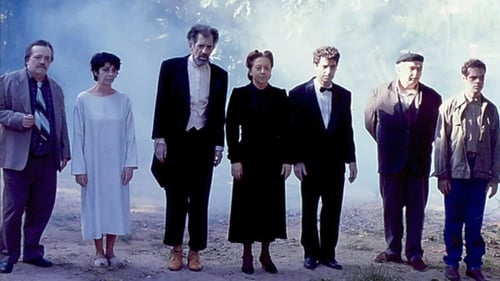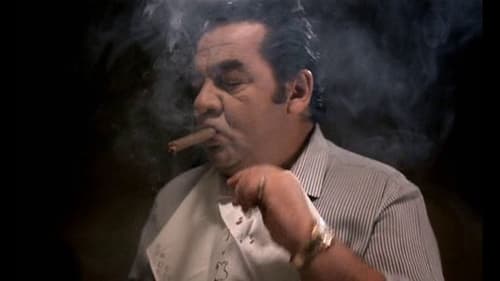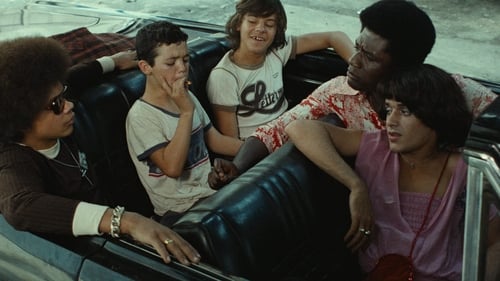Marília Pêra
出生 : 1943-01-22, Rio de Janeiro, Rio de Janeiro, Brazil
死亡 : 2015-12-05
略歴
Marília Pêra was a Brazilian actress hailed as "one of the decade's [1980s] ten best actresses" by Pauline Kael. Pêra won the National Society of Film Critics Award for Best Actress in 1982 for her role in Hector Babenco's acclaimed Pixote, and received Best Actress awards at the Gramado Film Festival (Triple Award Winner) and at the Cartegena Film Festival for Carlos Diegues' Better Days Ahead. Other films include Bar Esperança, Angels of the Night and Diegues' Tieta do Agreste.

Madame Claude
Selminha is a lower-class woman who receives a family inheritance, but only if she meets the challenge of spending 30 million reais in 30 days, without accumulating anything. However, in this marathon, she will find out that there are things that money does not buy.

Reader (voice)
Chico Buarque is a constant presence in Brazil's art scene and makes up its citizen's popular culture. This wealth in music, poems, theater and novels has been created over the last 50 years and in this film Chico Buarque converses about his memories, shows, daily life, work methods, creative process, in summary all his trajectory. The musician’s search for his German brother, whom he never got to meet, serves as one of the axis for the narrative.

Co-Producer
Wagner is a 22-year old Brazilian guy, who dreams about leaving the country for a better life, until he meets Justina, an experienced woman who turns his life upside down. Together they will discover that life has a lot more to offer.

Justina
Wagner is a 22-year old Brazilian guy, who dreams about leaving the country for a better life, until he meets Justina, an experienced woman who turns his life upside down. Together they will discover that life has a lot more to offer.

Self
A Brazilian theatre group that through talent, irony and humour confronted the Brazilian violent dictatorship in the 1970s revolutionising the gay movement worldwide and changing theatre and dance language to an entire generation.

Madame Castilho
The father of a family of lower middle class of São Paulo dies. But he did not realize this and starts to watch the reactions of his children and the collapse of the fragile family structure. Based on a novel of Mário Bortolotto.

Magda / Magali
Comedic portrait of middle-aged women in Rio de Janeiro, including overworked housewife Magali and her over-the-top twin sister Magda, psychoanalyst Paula and her troublesome daughter Melanie, and stage star in crisis Lise.

Following a newspaper ad, ordinary women tell part of their life stories to director Eduardo Coutinho, which are then re-enacted by actresses, blurring the barriers between truth, fiction and interpretation.

Self
A tribute documentary on Fernando Ramos da Silva, the famous child star of the acclaimed film by Hector Babenco, "Pixote, a Lei do Mais Fraco" (1981). 20 years after his assassination by the police, his co-stars and Babenco talk about Fernando's contributions to the film, his troubled life when his acting works didn't took off as expected (since he was typecast) and which made him turn back to his past life of poverty and crimes. The project also presents that film's influence to many directors and artists around the world.

Madame Clessy
While in the hospital, after being run over, Alaíde thinks about her life, specially after the moment she'd found the diary of Madame Clessy, in the house where her family had moved in, which was a former bordello.

Herself - Carmen Miranda
Directed by Maurício Sherman, the actress Marília Pêra sings hits by Carmen Miranda with 43 songs from the repertoire of The Brazilian Bombshell in 24 numbers, among them: “Na Batucada da Vida”, “As Cinco Estações do Ano”, “Uva de Caminhão” and “Me Respeite, Ouviu?”.

Vanessa
Living the Dream" is a docudrama about two friends who after being bullied as children become corrupt when growing up because they have been conditioned to believe that they need to achieve materialistic success to be 'accepted' and liked by others, in a society where the end justifies the means.

Vanderléia
The life of Brazilian soccer player, Garrincha, considered to be one of the greatest players of all time, with his uniquely original style. He had arched legs, a passion for women and booze. Also had a much talked extramarital affair with singer Elza Soares and died in relative decadence. The movie focuses on his zenith, from 1953 until the World Championship and the Rio Regional Championship, in 1962.

Amélia
Fictional story based on Sarah Bernhard's visit to Brazil in 1905. The actress, experiencing a personal and professional crisis at the time, is induced by her personal Brazilian maid, Amélia, to make a performance in Rio de Janeiro. After arriving, she is forced to stand the company of Amélia's exotic sisters.

Irene
かつて教師をしていたドーラは、今はリオデジャネイロの中央駅で代筆業を営んでいる。字の書けない人のために手紙を書くのが彼女の仕事だが、次第に何の感情も持たないようになり、その手紙を実際に出すことはほとんどなくなっていた。

Ana Lara
Fortune takes four human beings to the last frontier of passion. There, where love becomes almost inhuman and divine. As if he was a comet, Rafael, the traveler, appears at the party for the cities patron saint, in a small town in the interior of Minas Gerais. He is the one who brings passion and crime, vanishing afterwards, leaving a poetic feeling in the air, which is always deadly to the ones who stay. Mrs. Ana de Lara, the proud rich widow, and Missy, still a child, whose beauty and innocence are like the Tiê-Sangue, a red bird, are the travelers victims. There is also Master Juca do Vale, a criminal, whose passion turns him incredibly human, in this story of love, death, forgiveness and resurrection.

Perpétua
Just when her family starts believing that she is dead, and that they can expect a rich heritage, Tieta returns from São Paulo to her native village in Bahia, which she had been forced to leave long ago because of some involvement with a goat herd. Believed to be fabulously rich - and nobody knows how - she brings to the great disappointment of her family a young step-daughter and heir. With the arrival of Tieta turmoil enters into the life of her family and their fellow villagers. Most particularly into the life of her nephew - promised to the Church - and the young aspiring mayor.

Renata
Michael is a U.S. journalist who works for a Brazilian newspaper. One day he is put in charge of interviewing Father Louis Stephen, a famed catholic missionary who helps the needy in the jungles of Brazil. Yet he has one problem: the Father has rarely ever given an interview. However, Michael decides that he will be the first to have interviewed the Father personally, and goes on a journey to the center of Brazil, in search of the priest. Michael will soon know how hard it can be to get an interview, and that the Father's apparent media-shyness has deeper implications than he thought.

Erotildes da Conceição
Film adaptation of the TV Show in 1994, based on the novel of the same name by Érico Veríssimo. During a general strike in the city of Antares, gravediggers refuse to carry out burials, to increase pressure on employers. During the night, however, the dead claim the right to be buried.

Screenplay
Elas por Ela reconstituted the history of MPB between 1920 and 1970, from the female perspective, also showing the transformation of the role of women in society over these years. Marília Pêra chose 35 singers to honor and, from 50 songs, put together the script for the show.

Herself
Elas por Ela reconstituted the history of MPB between 1920 and 1970, from the female perspective, also showing the transformation of the role of women in society over these years. Marília Pêra chose 35 singers to honor and, from 50 songs, put together the script for the show.

Stage Director
Elas por Ela reconstituted the history of MPB between 1920 and 1970, from the female perspective, also showing the transformation of the role of women in society over these years. Marília Pêra chose 35 singers to honor and, from 50 songs, put together the script for the show.

Screenplay
Elas por Ela reconstituted the history of MPB between 1920 and 1970, from the female perspective, also showing the transformation of the role of women in society over these years. Marília Pêra chose 35 singers to honor and, from 50 songs, put together the script for the show.

Herself
Elas por Ela reconstituted the history of MPB between 1920 and 1970, from the female perspective, also showing the transformation of the role of women in society over these years. Marília Pêra chose 35 singers to honor and, from 50 songs, put together the script for the show.

Maryalva 'Mary" Matos
Earning her living by dubbing American TV Series, a woman dreams of becoming an international Hollywood star.

Marta Brum
Many exotic characters meet in São Paulo night, looking for love and adventure: Malu, a model; Mauro, the drag queen; Teddy, the hustler; Guto, the gay reporter; and Marta, an actress.

Rita la Punta
On the mean streets of New York City, a dog-eat-dog mentality reigns among the destitute citizens. In one of the many abandoned buildings in the neighborhood of Alphabet City lives the Brazilian Rita La Punta, along with her delinquent son, Thiago, and a gang of Hispanic teens charged with selling heroin and cocaine. When Rita and her young gang members get involved in a minor turf war, the violence escalates out of control, touching everyone and sparing no one.

Ana
A group of eccentric people gather at a popular bar in Ipanema, Rio de Janeiro. Among its costumers, we find Ana, an actress, and her husband Zeca, a writer in crisis about his work.

Sueli
10-year-old Pixote endures torture, degradation, and corruption at a local youth detention center where two of its members are murdered by policemen who frame Lilica, a 17-year-old trans hustler. Pixote helps Lilica and three other boys escape and they start to make their living by a life of crime which only escalates to more violence and death.

Pupi
Sought after by several reputable women, a bohemian becomes obsessed with a prostitute.

Rosinha
In a fictitious country, civil servant receives the greatest inheritance in history (ten trillion dollars) and is confined by authorities because he could break world economics. But he manages to escape.
























